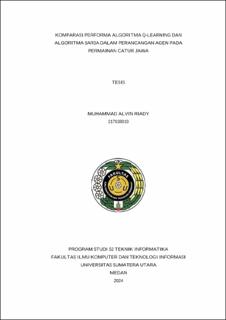Komparasi Performa Algoritma Q-Learning dan Algoritma SARSA dalam Perancangan Agen pada Permainan Catur Jawa
Comparison of The Performance of The Q-Learning Algorithm and The SARSA Algorithm in Agent Design for Javanese Chess Game

Date
2024Author
Riady, Muhammad Alvin
Advisor(s)
Suyanto
Sihombing, Poltak
Metadata
Show full item recordAbstract
Reinforcement learning is a prominent method in the development of artificial
intelligence for computer games, but its application in board games, especially
traditional Indonesian board games, is still relatively limited. In reinforcement
learning, there are two factors that influence algorithm performance, namely
learning rate and discount factor, which determine the optimal model to produce
the best intelligent agent. This research compares two reinforcement learning
algorithms, Q-Learning and SARSA, in Javanese chess, by comparing the winning
rate of each agent using various combinations of learning rate and discount factor
values, and determining the combination of these two parameters that is suitable for
an agent to win a round of a match. The test results show that in the scenario of the
Q-Learning algorithm against SARSA or vice versa, the SARSA algorithm
outperforms Q-Learning with a win rate of 58.4% compared to 58.1% for agent P1.
Meanwhile, for P2 agents, the Q-Learning algorithm outperformed SARSA with a
win rate of 28.9% versus 28.8% of the total win percentage. The optimal parameters
for Q-Learning are a learning rate of 0.06 and a discount factor of 0.8 for agent P1,
and 0.08 and 0.1 for agent P2. For the SARSA algorithm, the optimal parameters
are 0.03 and 0.5 for agent P1, and 0.06 and 0.7 for agent P2. These findings provide
valuable insights into selecting intelligent agents in board games other than
Javanese chess, thereby contributing to the advancement of Artificial Intelligence
in the context of these games.
Collections
- Master Theses [626]
